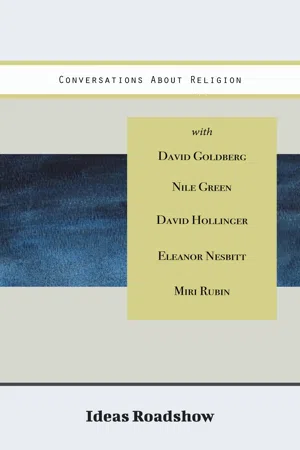
- English
- ePUB (mobile friendly)
- Available on iOS & Android
Conversations About Religion
About this book
FIVE BOOKS IN ONE! This collection includes the following 5 complete Ideas Roadshow books featuring leading researchers providing fully accessible insights into cutting-edge academic research while revealing the inspirations and personal journeys behind the research. A detailed preface highlights the connections between the different books and all five books are broken into chapters with a detailed introduction and questions for discussion at the end of each chapter: 1.Rabbi With A Cause: Israel and Identity - A Conversation with David J. Goldberg (1939-2019), former Senior Rabbi Emeritus of London's Liberal Jewish Synagogue and author and columnist. This wide-ranging conversation is based on Goldberg's book, This Is Not The Way: Jews, Judaism and Israel, which boldly explores a number of themes that interweave religion, politics, culture and identity in a way that is relevant to all of us, regardless of our cultural background or religious orientation. For many of us, caught as we are between love of tradition and the allure of contemporary liberal values, maintaining a coherent sense of personal identity is a highly delicate task indeed but Rabbi Goldberg has consistently been willing to meet the challenge head-on as explored in this thought-provoking discussion. 2.Religious Entrepreneurs? - A Conversation with Nile Green who holds the Ibn Khaldn Endowed Chair in World History at UCLA. Nile Green is an expert on Islamic History and religion in the world. He has traveled extensively in India, Turkey, Pakistan, China, Myanmar, Iran, Egypt, Yemen, Syria, Morocco and many more countries, to get a deep sense of the reality of situations on the ground. The basis of this detailed conversation is Nile Green's book Terrains of Exchange which is not only an account of how the Christian missionary movement affected the development of Islam in the 19th and 20th centuries, but also offers a bold new paradigm for understanding the expansion of Islam in the modern world through the model of religious economy.3.Battling Protestants - A Conversation with intellectual historian David Hollinger, UC Berkeley, and examines the unique role that different strands of religion have played in 20th-century American culture. This thought-provoking conversation examines intriguing aspects of the distinction between Ecumenical and Evangelical Protestantism, the often overlooked role of Ecumenical Protestantism in the history of the USA, secularization theory, the development of the two-party system, the role of missionaries, and more. 4.Exploring the Sikh Tradition - A Conversation with Eleanor Nesbitt who is Professor Emeritus of Education Studies at University of Warwick and a poet. Eleanor Nesbitt is an expert on Hindu and Sikh culture and her interdisciplinary approach straddles religious studies, educational theory, ethnography and poetry. After inspiring insights about the time Eleanor Nesbitt spent in India and her academic path, this extensive conversation provides a detailed exploration of the Sikh tradition: the history, religious tenets, other people's misconceptions about it and more.5.Religion and Culture: A Historian's Tale - A Conversation with Miri Rubin, Professor of Medieval and Early Modern History at Queen Mary University of London. After behind-the-scenes insights into Miri Rubin's career path which led her from chemistry to working in an orthopaedic hospital to studying medieval history with a 'cultural anthropologist" persuasion to the subject of medieval Christianity, this comprehensive conversation covers several books that Miri Rubin has written, including The Life and Passion of William of Norwich; Mother of God: A History of the Virgin Mary; Emotion and Devotion: The Meaning of Mary in Medieval Religious Cultures.Howard Burton is the founder and host of all Ideas Roadshow Conversations and was the Founding Executive Director of Perimeter Institute for Theoretical Physics. He holds a PhD in theoretical physics and an MA in philosophy.
Tools to learn more effectively

Saving Books

Keyword Search

Annotating Text

Listen to it instead
Information
Introduction
Cultural Contact
The Conversation

I. Historical Beginnings
From Jerusalem to Cambridge
Table of contents
- Textual Note
- Preface
- Rabbi with a Cause
- Religious Entrepreneurs?
- Battling Protestants
- Religion and Culture
- Exploring the Sikh Tradition
Frequently asked questions
- Essential is ideal for learners and professionals who enjoy exploring a wide range of subjects. Access the Essential Library with 800,000+ trusted titles and best-sellers across business, personal growth, and the humanities. Includes unlimited reading time and Standard Read Aloud voice.
- Complete: Perfect for advanced learners and researchers needing full, unrestricted access. Unlock 1.4M+ books across hundreds of subjects, including academic and specialized titles. The Complete Plan also includes advanced features like Premium Read Aloud and Research Assistant.
Please note we cannot support devices running on iOS 13 and Android 7 or earlier. Learn more about using the app